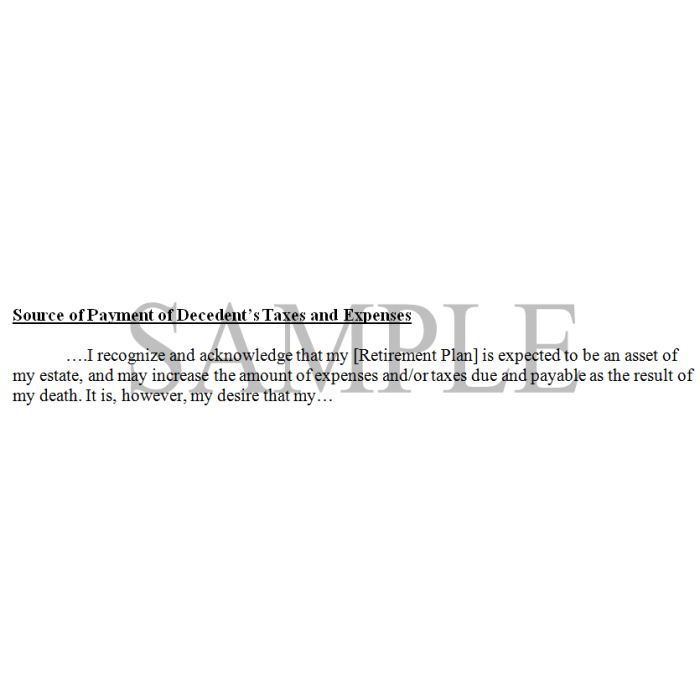Source of Payment of Decedent’s Taxes and Expenses (1 Page)
This Form is actually not a Beneficiary Designation Form, but is rather a clause that planners should consider inserting in the governing instrument (will or trust) of the participant’s estate plan. The purpose of the clause is to attempt to direct all payments of taxes and administration expenses arising as the result of the deceased participant’s death away from the retirement plan assets that may be included in the participant’s estate. Since a planning advantage of leaving retirement assets to designated beneficiaries is the opportunity to stretch out the required minimum distributions over the lifetimes of such beneficiaries, the opportunities for income tax deferral and asset value growth are significant. If the retirement plan asset is eroded by a forced contribution to the taxes or administration expenses due at the participant’s death, this planning opportunity is reduced as well.
This Form is actually not a Beneficiary Designation Form, but is rather a clause that planners should consider inserting in the governing instrument (will or trust) of the participant’s estate plan. The purpose of the clause is to attempt to direct all payments of taxes and administration expenses arising as the result of the deceased participant’s death away from the retirement plan assets that may be included in the participant’s estate. Since a planning advantage of leaving retirement assets to designated beneficiaries is the opportunity to stretch out the required minimum distributions over the lifetimes of such beneficiaries, the opportunities for income tax deferral and asset value growth are significant. If the retirement plan asset is eroded by a forced contribution to the taxes or administration expenses due at the participant’s death, this planning opportunity is reduced as well.
Author:
Steven G. Siegel is president of The Siegel Group, a Morristown, New Jersey - based national consulting firm specializing in tax consulting, estate planning and advising family business owners and entrepreneurs. Mr. Siegel holds a BS from Georgetown University, a JD from Harvard Law School and an LLM in Taxation from New York University.
He is the author of several books, including: Planning for An Aging Population; Business Entities: Start to Finish; Taxation of Divorce and Separation; Income Taxation of Estates and Trusts, Preparing the Audit-Proof Federal Estate Tax Return, Putting It Together: Planning Estates for $5 million and Less, Family Business Succession Planning, Business Acquisitions: Representing Buyers and Sellers in the Sale of a Business; Dynasty Trusts; Planning with Intentionally-Defective Grantor Trusts; The Federal Gift Tax: A Comprehensive Analysis; Charitable Remainder Trusts, Grantor Trust Planning: QPRTs, GRATs and SCINs, The Estate Planning Course, The Retirement Planning Course, Retirement Distributions: Estate and Tax Planning Strategies; The Estate Administration Course, Tax Strategies for Closely-Held Businesses, and Tort Litigation Settlements: Tax and Financial Issues.
Mr. Siegel has lectured extensively throughout the United States on tax, business and estate planning topics on behalf of numerous organizations, including National Law Foundation, AICPA, CCH, National Tax Institute, National Society of Accountants, and many others. He has served as an adjunct professor of law at Seton Hall and Rutgers University law schools.
The Siegel Group provides consulting services to accountants, attorneys, financial planners and life insurance professionals to assist them with the tax, estate and business planning and compliance issues confronting their clients. Based in Morristown, New Jersey, the Group has provided services throughout the United States. The Siegel Group does not sell any products. It is an entirely fee-based organization.
Contact the Siegel Group through its president, Steven G. Siegel, e-mail: [email protected].


